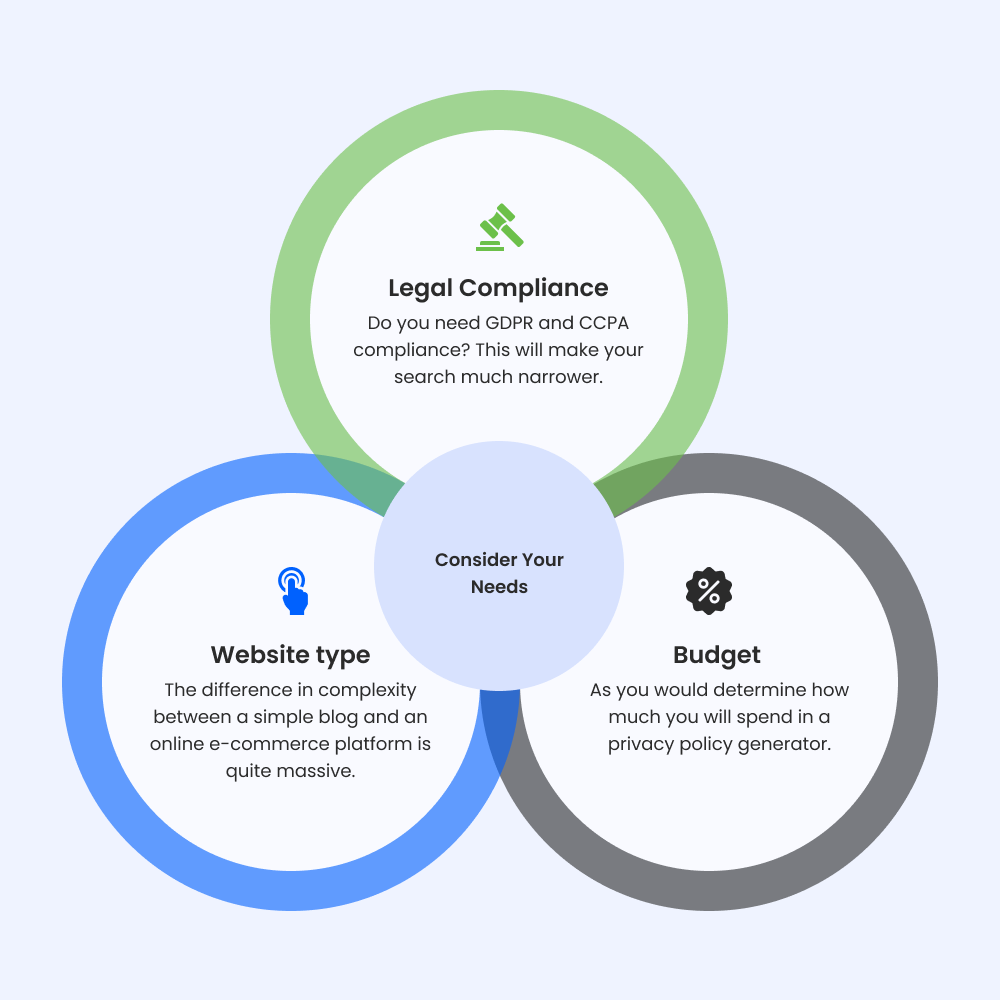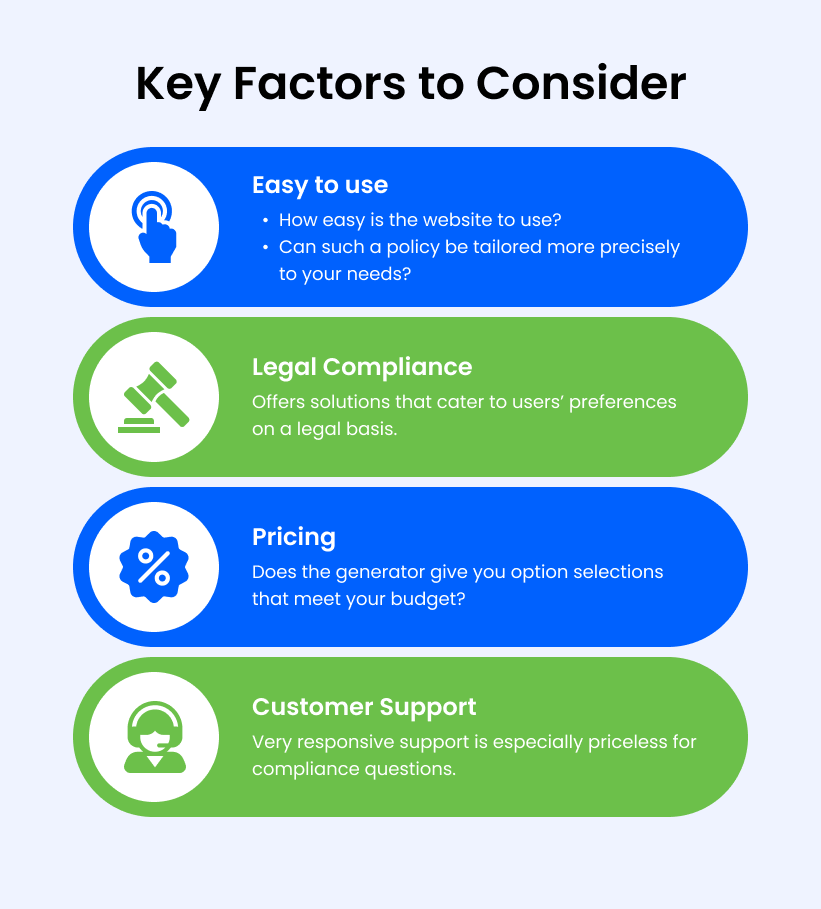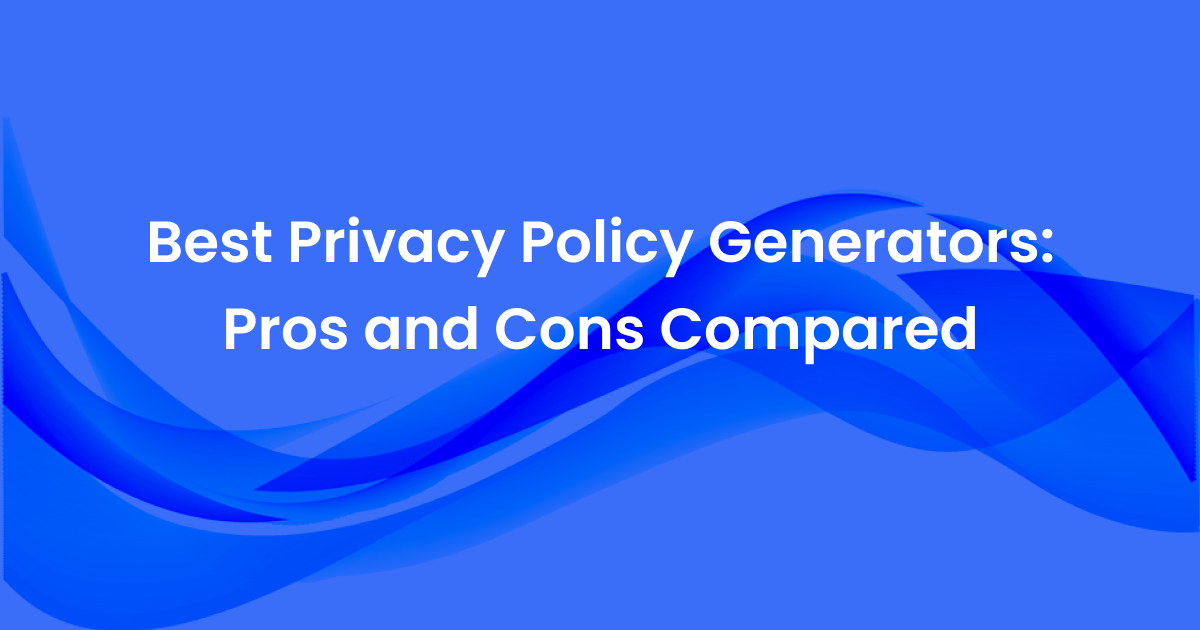Do you know that data is the new oil, and your privacy policy is the pipeline? Data breaches and online privacy scandals are so rampant in today’s digital age that protecting your users’ information matters.
Still, developing a legally sound and comprehensive privacy policy can become too burdensome even for the most seasoned legal experts. Well, come the self-titled saviours: the privacy policy generators.
Using all the powerful tools above, one can streamline processes to ensure that the business complies with GDPR and CCPA, among others, worldwide.
What is a Privacy Policy Generator?
These online tools help create privacy policies for your website or app. A privacy policy is a document that gives users what kind of data will be collected from them, called names, emails, or browsing information.
Information then describes why they collect it, how they will use it, and whether other organisations share information.
Generators ask questions about your business and data practices, then quickly produce a tailored policy.
This is important because laws like GDPR in Europe, CCPA in California, etc., all have rules about what websites should say about how they protect users’ personal information.
Privacy Policy Generators are helpful for businesses that need a quick, affordable way to comply with these rules.
Why Privacy Policy Generator Matters?
No matter what your business is or your website’s focus, privacy policy generators help comply with privacy laws, instil confidence in the users, and minimise exposure to lawsuits.
Here is the reason:
Obey the Law
In Europe, the GDPR and the CCPA laws of California require every website to have or state the purpose for which personal data is collected and processed. The danger of a website lacking a privacy policy is that penalties and lawsuits are in wait.
User Trust
Privacy is a crucial issue for many people. An affirmative privacy policy shows users that their personal information will be managed or handled reasonably and openly.
Convenience
The generators save time and, at the same time, cost less for small businesses and websites without legal consultants. They can formulate a privacy policy that will comply with legal provisions in no time.
How Does Privacy Policy Generator Work?
This is done so that one day, consumers will be inclined to create their privacy policy for their site or app by following a simple, easy-to-understand process. However, a Privacy Policy Generator usually works somewhat like this:
Questions about the Business
The assignee will proceed to ask for basic facts, starting with the project’s owner, the nature of the portal or app and the location of the business.
Data Collection Details
It would ask about the data collected, such as names, emails, and payment details, and how it’s gathered (e.g., forms, cookies, user accounts).
Purpose of Data Usage
They then go ahead and say the purpose of collecting this data, that is, is it for analytics, marketing, service improvement, etc.
Data sharing and security
The application will query whether the data is shared with third parties, such as advertisers and analytics tools. Moreover, it will further inquire into the measures put in place to ensure the safety of the said data.
Legal compliance
The generator adds clauses to meet regional obligations, such as GDPR for Europe and CCPA for California.
Policy output
Once all the above information is available, the generator will produce the final privacy notice. Generally, this can be clicked, copied, downloaded, and integrated into a site without hassle.
How to Choose the Right Privacy Policy Generator
Consider Your Needs:

Key Factors to Consider:

Top Privacy Policy Generators in 2024
Seers
Seers is a leading privacy policy generator, offering;
- Data Protection policies for website
- Data protection policies for the organisation
- Data Protection Policies for the Human Resource
It has powerful GDPR, CCPA, and LGPD tools to prepare legible and modifiable Terms and Conditions and Privacy Policies.
The company offers a one-stop solution for policy generation, easing privacy management and ensuring compliance.
In addition to privacy policies, Seers provides:
- Cookie consent management.
- Data protection impact assessment and consent logs.
- Thus, it is a digital compliance hub in itself.
Thanks to intuitive design and powerful automation, any business can use Seers, from small startups to large corporations, regardless of size.
The privacy policy generator integrates with popular CMSs like WordPress and Shopify, simplifying policy implementation.
In addition, given that the Seers platform supports several languages, companies can provide compliance to different user bases across the globe.
Pros of Seers
- Comprehensive Compliance
Seers includes all the elementary components of international data protection laws, such as GDPR, CCPA, and LGPD, so companies can quickly gain compliance with these international standards.
- User-Friendly Interface
The company developed the tool with a user-friendly interface that can be quickly followed by an individual with all levels of technological knowledge, such that a user can quickly generate compliant privacy policies.
- Multi-Language Support
The support for 59+ languages allows Seers to offer organisations an opportunity to have their privacy policies in several languages, thus being accommodative in different languages.
- Seamless CMS Integration:
The generator integrates seamlessly with popular websites such as WordPress and Shopify, allowing businesses to embed policies into their website directly.
- Educational Resources:
There are multiple sources from Seers regarding personal data protection acts. Business organisations will be able to know how these acts are continually amended.
Cons of Seers
- Advanced Features Limited to Higher-Tier Plans:
Advanced tools, such as greater customisation and additional compliance tools, are only offered in higher-tier plans. This ensures that complicated businesses get the recommended solutions. However, small companies may have to pay to upgrade to benefit from all the features.
WP Legal Pages
WP Legal Pages has tools to ensure the WordPress website owner understands and complies with GDPR, CCPA, etc.
It allows for documents as needed, such as Privacy Policies, Terms & Conditions, and Cookie Consent forms, and it manages cookie consent through automated scanning.
Pros
- Easy Legal page generator
- Supports multiple privacy law compliance
- Automated cookie scanner
- Customisable legal pages
- It supports all types of websites (blogs, eCommerce, etc.).
Cons
- WP Legal Pages is limited since it only supports WordPress websites.
- It doesn’t necessarily give you complete legal protection
- Customisation may be complex for non-technical users
- Some country’s laws are not covered
- Not an alternative to expert legal guidance
Termly
Termly is one of the online privacy policy generators that help firms generate compliant policies and ensure alignment with the many privacy regulations such as GDPR, CCPA, and PIPEDA.
Its interface is straightforward for businesses as they keep pace with changing laws.
Pros
- Generation of simple automated policies
- Compliance with global privacy laws
- Policy updates are regular
- It can easily be integrated into websites
Cons
- A free basic plan is available. The free plan is not very customised
- Paid plans can be costly
- It’s never a replacement for an attorney’s advice
- Features are limited in the free version.
- Advanced features may require third-party integrations.
Enzuzu
Enzuzo is a wide-ranging compliance platform that streamlines privacy for big and small-sized businesses.
The software offers customisable policy generation, consent management, and data privacy to comply with GDPR, CCPA, or Quebec Law 25 regulations.
Enzuzo is perfect for various domains, offering features like automatic legal policy updates and advanced cookie consent. It efficiently manages websites across different scales of operation.
Pros:
- Auto-update legal policies to keep pace with the regulations.
- Customise cookie consent banners across over 25 languages.
- Easily integrates with popular CMS platforms and eCommerce solutions.
- Supports DSAR (Data Subject Access Requests) to comply with GDPR and CCPA affordably priced and scaled for business size and needs
Cons:
- Advanced features may need a higher-tier plan.
- It can take some time to realise the platform’s full potential fully.
- A good fit for business sites that need a privacy-focused solution only may not be the best for more general needs.
- Customer support response times are not very reliable.
- Easy to use, but some intricate options require technical knowledge.
Complianz
Complianz is a WordPress extension that deals with various issues of privacy laws compliance, such as GDPR, PECR, or CCPA.
The plugin enables functions such as custom cookie policy management and policy. Hence, the websites are compliant with the privacy rules.
Pros:
- It is fast and straightforward to set up the configuration wizard.
- Consistent growth to remain in compliance.
- Competes with numerous international and regional laws.
- Adjustable according to the needs of the particular site.
- Great help and visibility.
Cons:
- Only available on WordPress.
- Limited features on the free version.
- It can be overwhelming for novices.
- Some users may experience some bugs.
- The premium plan may be too expensive for small websites.
Iubenda
Iubenda is one of the most commonly used verified privacy policy generators and can work with many international laws, such as GDPR and CCPA.
It offers tools with an easy user interface for building and updating privacy policies, cookie policies, and consent management.
Also, it has integrations to cookie banners, so the websites will always meet the legal conditions set forth by the laws regarding consent.
Pros
- Conforming to the primary international laws, such as GDPR and CCPA
- Offering automatic changes in policies considering current laws.
- Easy integration with web pages via widgets, links, or embedding.
- Cookie consent banners are customisable.
- Has an API for continuous policy updates without needing any human intervention
Cons
- Customer support may take a long time to respond.
- The website scanner tool may sometimes fail completely to recognise new services
- Some integrations might prove too technical for new users.
- It is on the higher side for the prices small businesses may need to pay
- It is challenging for inexperienced users to navigate the site.
Conclusion
With time, looking for terms of service and privacy policy generators has become essential for every website or application to adhere to international regulations such as the GDPR or the CCPA.
Whether you are a small-scale business developing an application or a big corporation does not matter. Choosing a suitable generator to keep your client’s information safe and ensure that their faith in you is not lost.
Seers remain among the leading favourites for its all-in-one compliance tools, ease of use, and ability to provide services in several languages.


